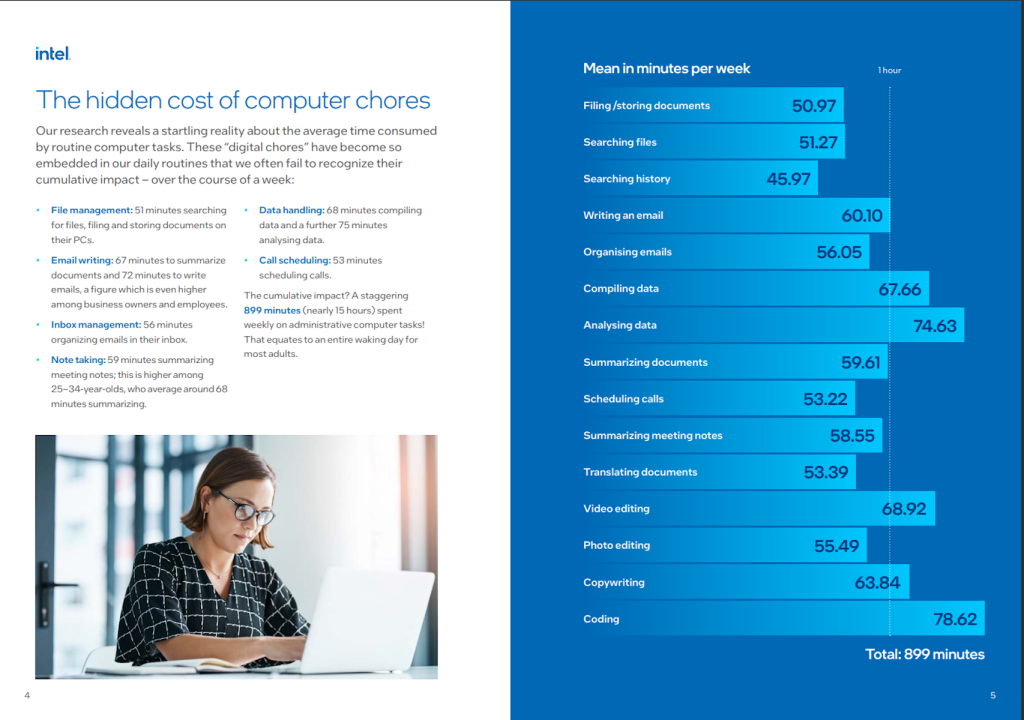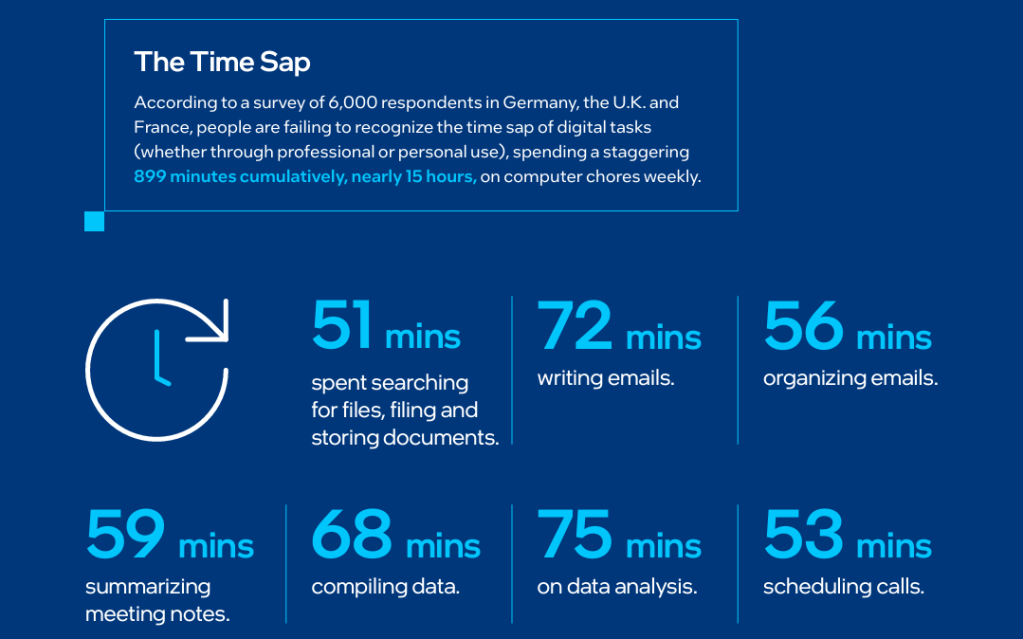
Virtually every PC manufacturer has announced, or is already producing, machines with embedded artificial intelligence (AI) functionality. The question is: Why?
Generative AI (genAI) for consumer use already exists through any number of cloud-based services, from OpenAI’s ChatGPT to Google’s Gemini and others.
Even so, next year will be “the year of the AI PC,” according to Forrester Research.
The research firm defines an AI PC as one that has an embedded AI processor and algorithms specifically designed to improve the experience of AI workloads across the central processing unit (CPU), graphics processing unit (GPU), and neural processing unit, or NPU. (NPUs allow the PCs to run AI algorithms at lightning-fast speeds by offloading specific functions.)
“While employees have run AI on client operating systems (OS) for years — think background blur or noise cancellation — most AI processing still happens within cloud services such as Microsoft Teams,” Forrester explained in a report. “AI PCs are now disrupting the cloud-only AI model to bring that processing to local devices running any OS.”
AMD, Dell, HP, Intel, AMD, Apple, Nvidia, and Lenovo have all been touting AI PC innovations to come over the next year or so. Those announcements come during a crucial timeframe for Windows users: Windows 10 will hit its support end of life next October, giving them a real reason to upgrade to Windows 11 — and buy new hardware.
Gartner’s latest worldwide AI PC shipment forecast projects a total 114 million units in 2025, an increase of 165.5% from this year. Key findings in the forecast include:
- AI PCs will represent 43% of all PC shipments by 2025, up from just 17% in 2024.
- The demand for AI laptops is projected to be higher than that of AI desktops, with shipments of AI laptops accounting for 51% of all laptops in 2025.
- By 2026, AI laptops will be the only choice of laptop available to large businesses, up from less than 5% in 2023.
“The debate has moved from speculating which PCs might include AI functionality, to the expectation that most PCs will eventually integrate AI NPU capabilities,” said Ranjit Atwal, senior director analyst at Gartner. “As a result, NPU will become a standard feature for PC vendors.”
As the PC market moves to AI PCs, x86 processor dominance will lessen over time, especially in the consumer AI laptop market, as Arm-based AI devices grab more share from Windows x86 AI and non-AI laptops, according to Atwal. “However, in 2025, Windows x86-based AI laptops will lead the business segment,” Atwal said.
But why bother embedding AI algorithms in a computer’s firmware or software — thus, requiring more expensive processors to power them — when you can access those same tools on the web? According to Tom Butler, Lenovo’s executive director of worldwide commercial product management, AI will fundamentally transform PCs, making them not only smarter but also more responsive and secure.
“We see AI-enabled PCs evolving to provide more personalized, adaptive experiences that are tailored to each user’s needs,” Butler said. “The rise of generative AI was a pivotal moment, yet reliance on cloud processing raises concerns around data privacy.”
Each component of a PC plays a unique role in making AI tasks efficient, but the NPU is key for accelerating AI computations with minimal power consumption, according to Butler. In general, he said, AI PCs assist in or handle routine tasks to be more efficient and intuitive for users without the need to access an external website or service.
Apple, for example, last month announced an updated iMac powered by its new M4 chip with an NPU core and Apple Intelligence, an AI-powered assistant that can help users write emails or other content. (More intensive or complex tasks can still be handed off to OpenAI’s ChatGPT. Apple also unveiled M4-powered MacBook Pro laptops and Mac minis — all while touting their strength in handling AI-related tasks.
AI PCs can also boost productivity by handling routine tasks such as scheduling and organizing emails, and by enhancing collaboration with real-time translation and transcription features, according to Butler.

Intel Corp.
Depending on the device, AI technology can also seamlessly integrate with cloud and edge computing for real-time data processing, enabling faster and more informed decision-making. AI-enabled PCs also increase device security by automating threat detection and adapting to new threats as they arise.
For example, Butler said, Lenovo’s Smart Connect enhances device synergy, allowing users to transition seamlessly between Lenovo devices, while ThinkShield provides security across the ecosystem, protecting users in real time.
AI-powered PCs however, generally require more RAM to handle advanced tasks. Apple, for example, is moving from a minimum of 8GB of RAM to 16GB.
Lenovo took a slightly different approach in its RAM support of AI tasks. The company’s “Smarter AI for All” tries to match the complexity of tasks to processing needs. For example, 16GB is suitable for lighter AI tasks when combined with a more powerful NPU, while 32GB or more is suited for users handling complex applications, large language models, or deep learning.
“Users working within AI development spheres will most likely require more RAM, combined with powerful GPU and CPU to ensure low latency and AI model fine-tuning capabilities,” Butler said.
Could AI make things harder?
Ironically, though, the results of a new survey and study conducted by Intel found that current AI PC owners spend more time on tasks than people who use PCs without AI technology. The survey of 6,000 consumers from Germany, the UK and France, found about 53% believe AI-enabled PCs are only good for “creatives or technical professionals.” And 44% see AI PCs mainly as “a gimmick or futuristic technology.”
In all, the survey showed that, in general, users spend 899 minutes cumulatively, nearly 15 hours, on computer-related chores weekly. Intel’s study showed that current AI PC owners spend longer on tasks than their counterparts using traditional PCs because many spend “a long time identifying how best to communicate with AI tools to get the desired answers or response.
“Organizations providing AI-assisted products must offer greater education in order to truly showcase the potential of ‘everyday AI,’” Intel argued.

Intel Corp.
When its uses are understood, leveraging AI tools to handle repetitive tasks, streamline workflows, or even assist in research can greatly boost productivity, according to a 2023 study by AI safety and research company Anthrophic.
While only 32% of respondents who aren’t familiar with AI PCs would consider purchasing one for their next upgrade, that percentage jumps significantly to 64% among respondents who have used one before. The survey and study also stated that “early data” suggests AI-enabled PCs can also save users about 240 minutes a week on routine tasks.
The problem is that many AI-PC owners simply aren’t aware of the benefits of AI or don’t know how to access the tools, Anthrophic argued. “Despite AI PCs becoming more available to people, 86% of respondents have either never heard of or used an AI PC. Meanwhile those respondents who already own an AI PC are actually spending longer on digital chores than those using a traditional PC.
The study concluded that “greater consumer education is needed to bridge the gap between the promise and reality of AI PCs.”
For business-to-business (B2B) purposes, AI PCs offer a promising solution, according to Mike Crosby, executive director and industry advisory service Circana.
Just three of 20 US business sectors defined by federal government, including professional and scientific, finance, and health care, represent nearly 50% of the total AI PC unit sales, Crosby said. “Companies are evaluating these new technologies carefully, weighing the benefits of innovation against the risks to their established environments.”
The upcoming October 2025 sunset of Windows 10 support further amplifies the urgency for AI PCs, with nearly 60-70% of the installed base still on older versions. Microsoft’s extended security update (ESU) offers a temporary reprieve, but Circana expects modernization to ramp up quickly as the deadline approaches.
